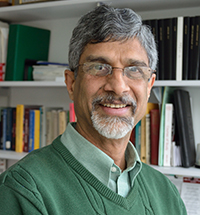非常抱歉,
你要访问的页面不存在,
非常抱歉,
你要访问的页面不存在,
非常抱歉,
你要访问的页面不存在,
验证码:

职称:Jean & Douglas McLean Professor in Fiber Science & Apparel Design
所属学校:Cornell University
所属院系:college of human ecology
所属专业:Fiber, Textile and Weaving Arts
联系方式: (607) 255-1875
After obtaining Ph.D. from North Carolina State University in 1984 Dr. Netravali joined the Department of Materials Science and Engineering at Cornell University as a postdoctoral associate. In 1985 he joined the Department of Mechanical Engineering as a research associate and in August of 1987 he joined the Department of Fiber Science & Apparel Design as an assistant professor of Fiber Science. His main research is in the field of Fiber Reinforced Composites and Green Materials. Within the composites area the primary focus of his group has been in developing Green resins from plant-based proteins and starches and reinforcing them using plant-based fibers to fabricate environment-friendly, green composites for a variety of applications. In the past few years, his research group has developed green resins and adhesives that have excellent mechanical properties; in some cases, better than commonly used epoxy resins. These carbon-neutral alternatives for the conventional petroleum-based composites are fully compostable at the end of their life. His group has also made ‘Advanced Green Composites’ with high strength and toughness that can be used in primary structural as well as ballistic applications. The second focus of his group is modification of fiber surfaces to control fiber/resin interface characteristics in composites. His research group has used many techniques including polymerizing and non-polymerizing plasmas, pulsed excimer laser, high power ion beam, solvent treatments, etc., to modify fiber surface chemistry and topography and controlling their adhesion to resins and thus the mechanical properties of composites. A third focus of his group is to develop new green nanofibers from proteins and starches for a variety of applications including high efficiency filtration and bacterial nanocellulose from food and agricultural waste for composite and medical applications.
I teach FSAD 1350, Fibers, Fabrics and Finishes, alternate years, for freshmen in the department of Fiber Science & Apparel Design. While this course is required for all FSAD students, students from other departments within the College of Human Ecology as well as other colleges across the campus and sometimes outside Cornell (Ithaca College) take the course to fulfill their science requirements. The course introduces the students to various natural and synthetic fibers, production and properties of yarns and fabrics as well as dyeing and finishing of yarns and fabrics. Teaching this course is always a challenge because of the diverse interests and backgrounds of the students. Students are taught both conventional and new materials, including the green and sustainable materials, conventional fiber applications, latest innovations in the field and new technologies/applications of fibers. FSAD 1360, Fiber and Yarn Analysis Laboratory, consists of several lab sessions in which students learn techniques to identify and characterize fibers and yarns. This course is restricted to FSAD students only and gives them hands on experience. I teach this course every other year, together with FSAD 1350. Since Spring of 2014 I have taught FSAD 3320, Product Quality Assessment for FSAD students. This course discusses quality of textile products from fibers to apparel and methods to assess the quality. The course is meant for FSAD junior students. I also teach FSAD 3350, Fiber Science, at the undergraduate level and FSAD 6200, Physical Properties of Fiber Forming Polymers and Fibers, at the graduate level. FSAD 3350 is designed for our students in the Fiber Science option and is a recommended elective for Materials Science and Engineering (MSE) and Chemical and Biomolecular Engineering (CBE). However, students from other colleges as well as other departments in CHE have also taken this course. FSAD 3350 also has lab sections for characterizing various fiber properties. This course has been useful in attracting MS&E students in Fiber Science program. One MS&E undergraduate student did research in my group in 2014. Several other students have worked in other faculty labs. A few years ago we also launched Fiber Science minor. FSAD 6200 is a theoretical course that includes properties of polymers and relationship between fiber structure, fiber chemistry and their physical properties. Thermal, mechanical, and other properties of fibers and methods of characterizing them are also discussed. While this course is meant for graduate students in FSAD, students from other colleges, particularly engineering, also take it. Ongoing teaching goals are to refine and strengthen course contents for all courses while incorporating the latest research into FSAD 6200, FSAD 3350 and FSAD 3320. When possible, I also invite industrial guest lecturers to give students the opportunity to get the industrial perspective. Many times the guest speakers also serve as future contacts for students during their job searches. I also collect and have a large collection of interesting specimens to show in my classes. Students always appreciate the real life examples in the class as it connects the theory to the real life situations.